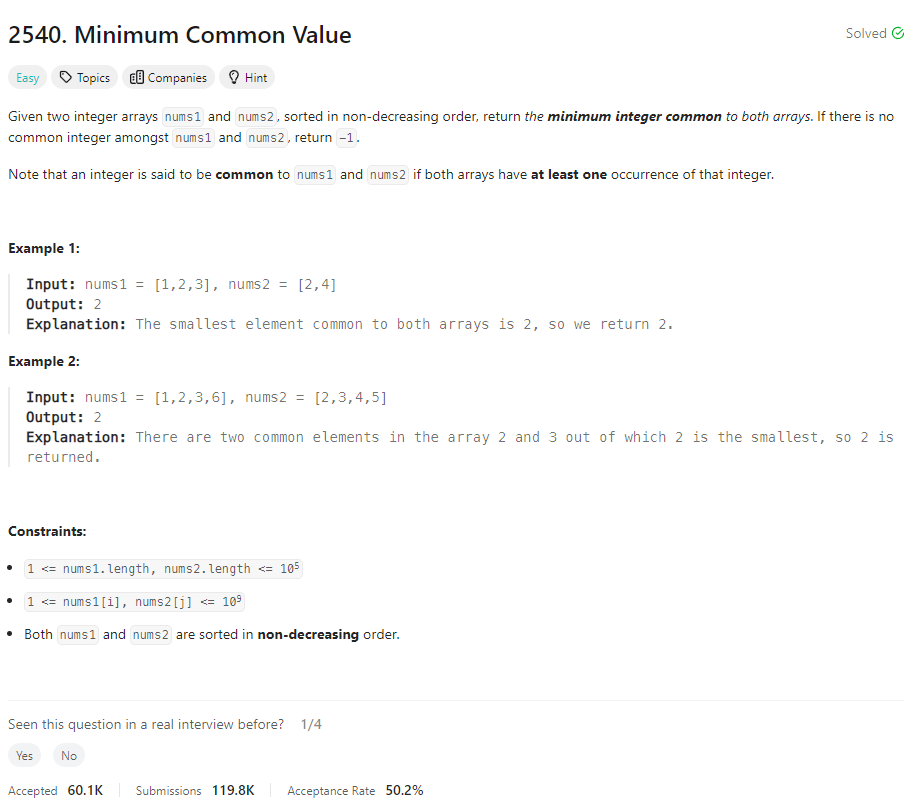Problem of The Day: Minimum Common Value
Problem Statement
Two Pointer Approach - Accepted
Intuition
The problem involves finding a common element between two sorted arrays.
Approach
I approach the problem by using two pointers, i and j, initialized to the start of both arrays. I iterate through the arrays, comparing elements at the current positions. If the elements are equal, I update the result. If the element in the first array is smaller, I increment i; otherwise, I increment j. The loop continues until one of the arrays is exhausted or a common element is found.
Complexity
-
Time complexity: O(M + N)
-
Space complexity: O(1), as no additional data structures are used; only a constant amount of extra space is required.
Code
class Solution:
def getCommon(self, nums1: List[int], nums2: List[int]) -> int:
i = j = 0
res = -1
while i < len(nums1) and j < len(nums2):
if nums1[i] == nums2[j]:
res = nums1[i]
break
elif nums1[i] < nums2[j]:
i += 1
else:
j += 1
return res
Two heap Approach - Accepted
Intuition
The idea is to use two heaps in order to find the common smallest element.
Approach
I approach the problem by first heapifying both input lists. Then, I use a loop to compare the smallest elements at the tops of both heaps. If they are equal, I update the result. If the element in the first heap is greater, I pop the element from the second heap, and vice versa. The loop continues until one of the heaps is empty or a common element is found.
Complexity
-
Time complexity: O(N log N), where N is the maximum of the lengths of nums1 and nums2. The heapification process takes O(N log N) time.
-
Space complexity: O(1), as the heaps are modified in-place.
Code
class Solution:
def getCommon(self, nums1: List[int], nums2: List[int]) -> int:
heapq.heapify(nums1)
heapq.heapify(nums2)
res = -1
while nums1 and nums2:
if nums1[0] == nums2[0]:
res = nums1[0]
break
elif nums1[0] > nums2[0]:
heapq.heappop(nums2)
else:
heapq.heappop(nums1)
return res
Editorial Solution
Approach 1: Hash Set
class Solution:
def getCommon(self, nums1: List[int], nums2: List[int]) -> int:
set1 = set(nums1)
set2 = set(nums2)
common = set1.intersection(set2)
if common:
return min(common)
else:
return -1
Approach 3: Binary Search
class Solution:
def getCommon(self, nums1: List[int], nums2: List[int]) -> int:
def binary_search(target, nums):
left = 0
right = len(nums) - 1
while left <= right:
mid = left + (right - left) // 2
if nums[mid] > target:
right = mid - 1
elif nums[mid] < target:
left = mid + 1
else:
return True
return False
# Binary search should be done on the larger array
# If nums1 is longer, call getCommon with the arrays swapped
if len(nums1) > len(nums2):
return self.getCommon(nums2, nums1)
# Search for each element of nums1 in nums2
# Return the first common element found
for num in nums1:
if binary_search(num, nums2):
return num
# Return -1 if there are no common elements
return -1
